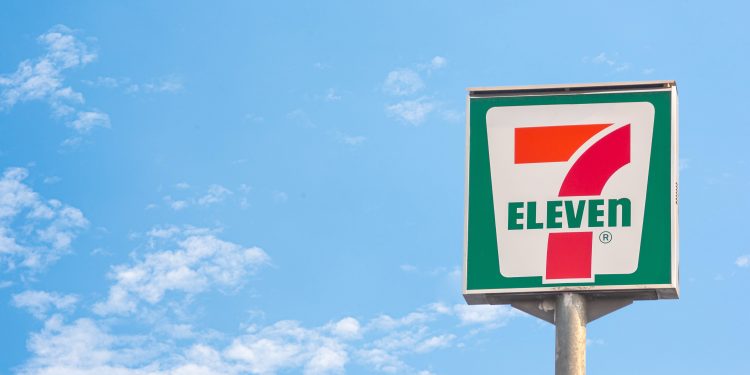The convenience store’s breakup doesn’t seem worth more than Couche-Tard’s takeover proposal. Its best defense from here? Amp up the bid’s antitrust risk.
The company behind 7-Eleven will at last be called “7-Eleven.” That was one notable feature of the unofficial defense strategy outlined by Japan’s Seven & i Holdings Co. on Thursday in the face of an unwanted $47 billion takeover approach from Canada’s Alimentation Couche-Tard Inc.
But the substance of the plan, rounding out an existing breakup idea, wasn’t much weightier than the name change.
Seven & i has a history of weak performance, and it continues to struggle. Its low- to mid-income consumers are feeling the pinch with inflation. Guidance for net income this year has just been cut by nearly 50%.
Chief Executive Officer Ryuichi Isaka acknowledges the need to respond faster to the challenges. The overarching plan is to simplify the conglomerate and focus Seven & i on its convenience store business. For all the rhetoric about the need for speed, progress is frustratingly slow.
Isaka now plans to gather most of the business outside 7-Eleven, mainly Japanese superstores, into a new “intermediate company.” This will seek investment from partners ahead of a potential listing — the obvious candidates would be private equity firms. The remaining Seven & i would retain a minority stake, due to continuing a commercial relationship between the two.
This feels like a needless rigmarole when a clean break would be better. Can’t Seven & i just sell these businesses today? It’s not clear whether this new entity would be an appealing initial public offering. The company seems to think that equity partners will help magic up a decent investment case.
The units here include the original kernel of today’s conglomerate before convenience came to dominate. You can see the resistance to rapid change. But there’s little room for sentimentality.
The other obvious disposal candidate is Seven Bank. Seven & i is looking at selling part of its roughly 50% holding, Bloomberg News has reported. Still, there was no concrete news here either.
Finally, there’s the need to improve the performance of the US 7-Eleven business. Seven & i has been closing underperforming stores, and margins have shown some resilience. But still, the targets look unambitious, with the goal of 1.5% like-for-sale sales growth in the 2025 fiscal year and an 80-basis-point increase in gross margins to 34.1%.
These actions don’t represent a clear path for getting the share price above $18.19, the level Bloomberg News reports Couche-Tard to have dangled, compared with its current market value of $15.66. The best interpretation of Seven & i’s update is that it’s kept an awful lot in reserve in case it needs to show more upside to shareholders in a protracted fight with Couche-Tard.
Should Seven & i now enter talks with its suitor? Ostensibly, the overture sounds sweet enough. It’s pitched 53% over the target’s undisturbed stock price (in dollars) and 15% above the average analyst price target in mid-August. The proposal clears Seven & i’s all-time closing high too. Financing such an offer — worth $67 billion including net debt as calculated by Bloomberg — is unlikely to be a problem. Canadian pensioners stand ready to write a check pending the details of a concrete bid.
Seven & i could perhaps get the price up a bit more by engaging with the Canadians to pinpoint concrete synergies. The snag is that the potential combination’s vast overlaps in the US are already triggering antitrust scrutiny. This looks surmountable with an adequately sized store disposal program. But Couche-Tard needs the cooperation of Seven & i to get a deal over the hurdle, making a hostile offer risky.
The onus is on the bidder here to devise a plan to assuage regulators. Couche-Tard can do that from the outside — the overlaps are plain to see. Likewise, it can come up with a suitably calibrated break fee — something around $2 billion could make sense, according to merger arbitrage research boutique Tebbs Capital. A few more goodies from Couche-Tard, and Seven & i’s continued resistance will be hard to justify.
By Chris Hughes / Courtesy Bloomberg












